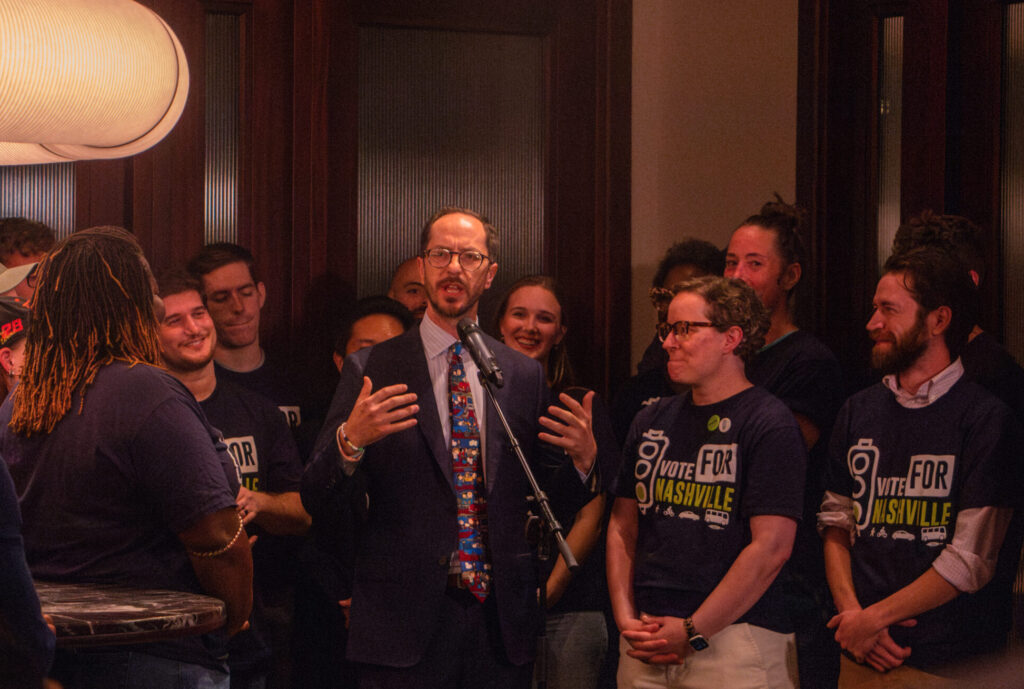
In a decisive vote, Nashvillians approved a measure to raise the local sales tax by a half-cent to fund $3.1 billion in transportation improvements. This creates a dedicated funding source that could radically change Nashville’s transit system, which has lagged behind most of the nation’s metropolitan areas.
This referendum was the city’s second attempt at establishing this revenue stream and will begin to bring the city up to speed. But the proposal — which will implement things like a bus rapid transit network, 24/7 bus service, 86 miles of new sidewalks, updated traffic signals and a dozen new transit centers — will be, by no means, an overnight transformation.
What’s next for Nashvillians
The proposal that Mayor Freddie O’Connell put forth is a 15-year plan. Many of the large-scale projects — like dedicated transit lanes along major corridors — could take years, if not decades, to implement.
“I do want to be clear: the changes will take time,” O’Connell told reporters Wednesday. “We would wish for a faster implementation. But again, that 15-year horizon for build-out is something we knew from the get-go.”
In the short-term, Nashvillians can expect to see some changes. The sales tax bump will go into effect in February. Metro will begin receiving those dollars in April, and, within the next year some sidewalks and signals will begin to get attention around Nashville. The special low-income fare program — which will allow residents who qualify for housing or nutrition assistance to access subsidized rides — will likely go into effect in the first year.
There will also be some bus service improvements, although WeGo is not yet in a position to increase bus service to 24/7. That will require adding buses to the fleet and hiring more drivers.
Metro’s action steps
O’Connell has announced the creation of a new position in his office — the “chief Program officer” for Choose How You Move. Whoever steps into this role (the job posting will go live Wednesday) will play a crucial role in overseeing this plan’s implementation and working with Metro departments, the community and private partners.
Over the next few weeks, Metro Finance and the procurement team will begin holding info sessions for interested partners. O’Connell also announced the formation of an advisory committee, as well as committed to providing quarterly reports to various Metro Council committees and annual audits to the public.
Could the presidential result alter implementation?
The election of Donald Trump could challenge federal funding scenarios anticipated in the plan.
The local sales tax surcharge is anticipated to bring in around $100 million per year. The administration has planned to supplement this with around $1.4 billion in federal funds — and Nashville would become more competitive for this money with more robust local matching dollars.
However, the bulk of these funds are authorized under the Bipartisan Infrastructure Law and the Inflation Reduction Act, both of which will expire in 2026.
O’Connell said he remains confident in the city’s ability to access those dollars.
“They have been fairly consistent over decades, regardless of makeup of Congress or who is in the White House,” O’Connell said. “And so we think that most of the funds will be there. It’s a 15-year program, so it will last across multiple different congressional elections and federal elections.”
Trump has proposed rescinding Inflation Reduction Act funds, and some conservatives have suggested eliminating elements of the Federal Transit Administration. Either action would impact federal transit funding, and, in turn, what money is available to Nashville.
In this situation, O’Connell said the city would have to reassess some elements.
“If the money is not there, we wind up having to value engineer probably some elements. That probably means the most intensive capital elements of the program would be reduced,” O’Connell said. “But we think that from a basic service level delivery from a basic sidewalk and infrastructure delivery, we can get done what we need to get done.”

